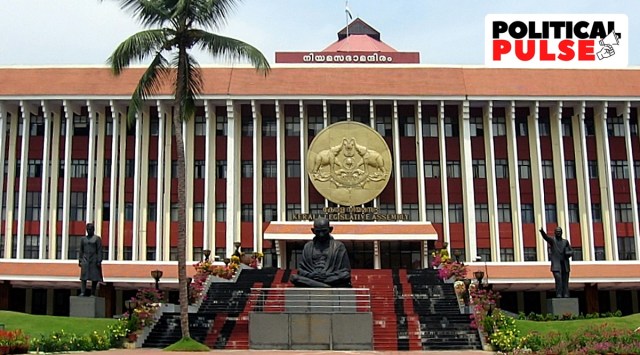A ‘weakened’ Lok Ayukta for Kerala: Why Oppn is crying foul
CPM leader and Law Minister P Rajeev defended the changes arguing that many states, including Congress-ruled ones, had not even brought the CM under the purview of the Lok Ayukta Act.
 A view of the Kerala Assembly. (Credit: Wikimedia Commons/Rajithmohan)
A view of the Kerala Assembly. (Credit: Wikimedia Commons/Rajithmohan)Days after the Karnataka High Court restored the powers of the Lokayukta to investigate cases of corruption, in a snub to the state government, the Kerala Assembly on Tuesday passed the Lok Ayukta (Amendment) Bill, 2022, taking away much of the authority of the organisation.
The Bill was passed amidst an Opposition walkout, and replaces an ordinance issued by the Left Democratic Front government in February this year on the same, which Governor Arif Mohammed Khan had refused to clear.
The changes:
Competent Authority
The Kerala Lok Ayukta Act, 1999, passed by the then LDF government, mandated that a public servant (including the chief minister and ministers) vacate their office in the event that the Lok Ayukta or Upa Lok Ayukta submits a report holding them guilty of corruption. The report was binding on the government, with the competent authority (the Governor, government or CM, depending on the accused party) required to accept the finding and submit an action taken report to the Lok Ayukta within 90 days.
As per the amendment cleared on Tuesday, the Lok Ayukta or Upa Lokayukta can now only make a recommendation to the competent authority, which can then accept or reject it. The Governor is no longer one of the competent authorities, with the Legislative Assembly instead taking over if the CM is the accused. In the case of Cabinet ministers, the competent authority is the CM, and for MLAs, it is the Speaker.
In short, a party in power, with a majority in the Assembly, can reject any indicting report against a CM.
Deadline
In another change, while the Act required the competent authority to submit an action taken report to the Lok Ayukta or Upa Lok Ayukta within 90 days, including reasons for not taking any action, it no longer stands in case of the CM as the authority concerned is the Assembly.
Scope
The 1999 Act had provisions to probe complaints against state-level office-bearers of political parties. The amendment omits political leaders from the purview of matters probed by the anti-corruption agency.
Appointment
The Act stated that the Lok Ayukta must be either a retired judge of the Supreme Court or a retired Chief Justice of a High Court. Now, a retired judge of a High Court can also be considered for the post of Lok Ayukta.
Regarding the Upa Lok Ayukta, the Act stated that a retired or sitting High Court judge be considered. Now a sitting judge need not be considered.
Terms of office
The Act fixed this at five years from the day a Lok Ayukta or Upa Lok Ayukta assumed office. The amendment says they can continue in office till the age of 70.
Vacancy rules
The amendment brings in a provision that in the event of any vacancy in the office of the Lok Ayukta by reason of death, resignation or otherwise, the Governor may authorise the senior-most Upa Lok Ayukta to act as one till the appointment of a new Lok Ayukta.
Besides, when the Lok Ayukta is unable to discharge his functions owing to absence, leave or otherwise, the Governor may authorise the senior-most Upa LokAyukta available to discharge the functions.
The argument
CPM leader and Law Minister P Rajeev defended the changes arguing that many states, including Congress-ruled ones, had not even brought the CM under the purview of the Lok Ayukta Act. “The Lok Ayukta only has an investigating role, it has no judicial powers. The existing Kerala Lok Ayukta is against the Constitution and the legal system. In the existing Act, the Lok Ayukta has the role of investigating agency as well as that of a judicial body. By amending it, we have rectified a mistake prevailing for the last 23 years,” he said.
Accusing the government of “weakening the Lok Ayukta”, Congress legislator and Opposition leader V D Satheesan said: “By making the Legislative Assembly the authority to take a decision on a Lok Ayukta report against the CM, there is encroachment of power. How can the Executive take a decision on the recommendation of a quasi-judicial body? The job of the Executive is to implement legislation enacted by the Assembly and the verdicts of the judiciary. This amendment is unconstitutional,” he said.
The cases before Lok Ayukta
Five cases are pending before the authority right now pertaining to anomalies in releasing assistance from the Chief Minister’s Distress Relief Fund during the previous LDF regime. An activist, R S Sasikumar, had complained against Chief Minister Pinarayi Vijayan and his previous Cabinet. During that term, then higher education minister K T Jaleel was also forced to quit on charges of nepotism following a verdict from the Lok Ayukta.































